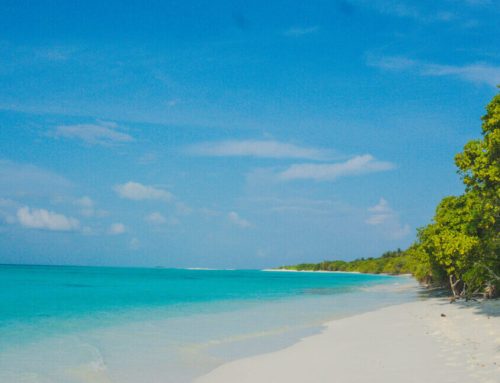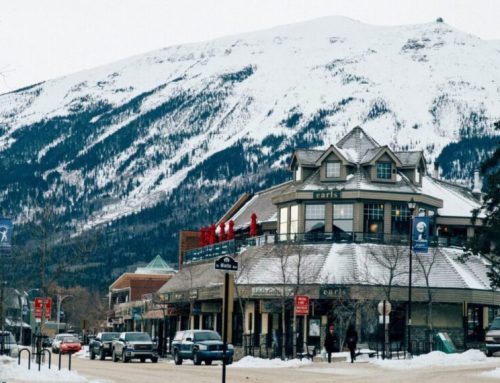Destination Stewardship Report – Spring 2022 (Volume 2, Issue 4)
This post is from the Destination Stewardship Report (Spring 2022, Volume 2, Issue 4), an e-quarterly publication that provides practical information and insights useful to anyone whose work or interests involve improving destination stewardship in a post-pandemic world.
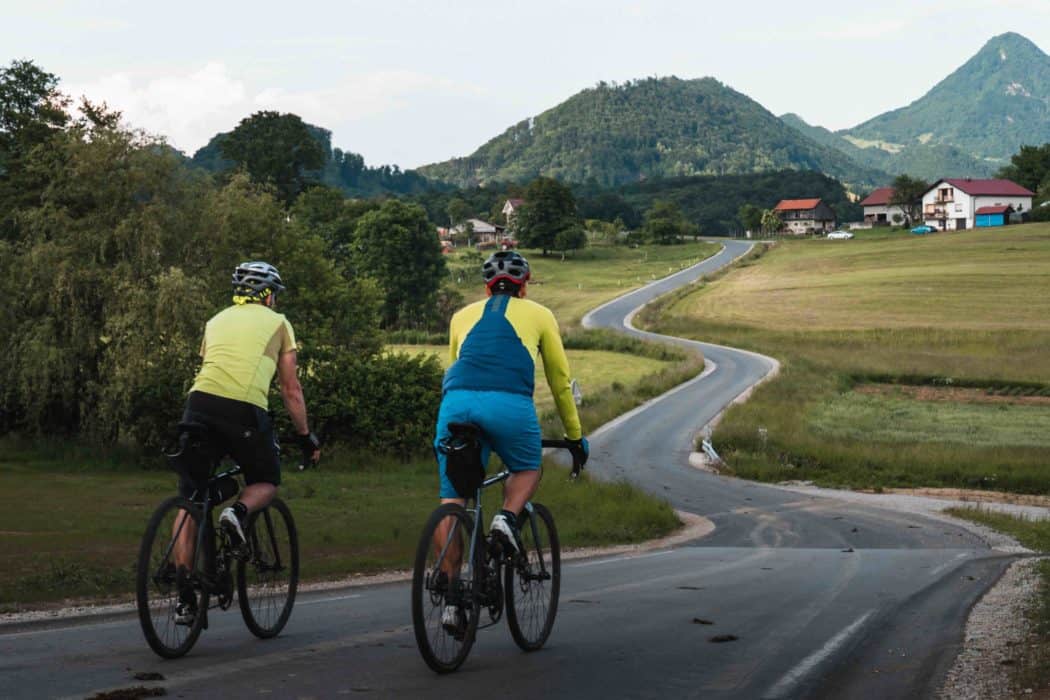
Bicyclists on the SGGR near Ptuj, eastern Slovenia All photos courtesy GoodPlace.
Slovenia’s Green Gourmet Tourist Route
Expanding the Green Scheme of Slovenian Tourism inspired Jana Apih and Sara Mavrič of GoodPlace to create a new step toward putting the Slovenia Green concept into practice. Here they describe how uniting stakeholders committed to a greener future can transform sustainability principles into memorable and tasty experiences for visiting bicyclers and hikers, who thereby support responsible local businesses.
A Delicious Way to Promote Sustainability, Educate the Visitor, and Benefit Communities
You’re bicycling along the Slovenia Green Gourmet Route (SGGR). In this green pocket-size country the landscape changes fast. Around each corner you’ll find a new local story, an untouched forest, romantic vineyards, or a vibrant town. In just one day you can wake up with a spectacular view of high mountains, fill your lungs with fresh cold air, smell the mountain flowers; then bike along the wild Soča river, observing shepherds looking after their stock and stopping by a local farm to taste fresh cheese; and finally ride through vineyards at sunset. Dinner is a special treat at a high-end restaurant offering an innovative, surprising menu of local items. The day will stay with you – a taste of Slovenia.
The SGGR is an innovative product based on principles of responsibility. The route emphasizes the sustainable and gastronomic features of the country and brings benefits to local providers and communities. Slovenia being declared a European Region of Gastronomy for 2021 encouraged us at GoodPlace to create a green-certified cycling/hiking itinerary that takes advantage of the rich gastronomic offerings of diverse Slovenian regions while rewarding the sustainability efforts of Slovene tourism stakeholders.
Slovenia Green
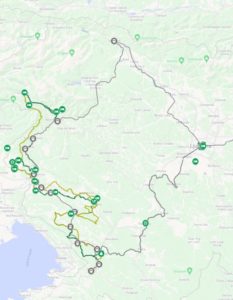
The western portions of the SG Gourmet Route.
The SGGR is one of three completely “green” routes: Alps to Adriatic, Capitals Route, and the Gourmet Route. We believe these three to be the first and only such designated tours in the world, as they exclusively connect destinations that have been awarded the Slovenia Green certificate. We created the concept of the Slovenia Green Routes for members of the Consortium Slovenia Green (CSG), an informal body connecting destinations and businesses united by being certified under the Slovenia Green brand.
The Slovenian Tourist Board assigned GoodPlace to help develop this national certification programme, the Green Scheme of Slovenian Tourism. Almost 60 tourism destinations (which account for almost 80% of all tourism arrivals in Slovenia) and 164 tourism businesses have joined the Green Scheme as of May 2022, committing to a green future and sustainable tourism development. (See accompanying story.)
The Green Scheme provides the base for three Slovenian initiatives aimed at encouraging responsible tourism development: (1) Green Scheme certification, (2) Training and tools, (3) Green Products. Having helped develop the Scheme, GoodPlace now acts as an accredited partner responsible for evaluations and development. The whole spectrum of the Green Scheme allows us to continually evaluate the sustainability of destinations and tourism businesses through the certification program.
Green Gastronomy
In the case of SGGR we sought to promote local supply chains, local businesses, and local stories that convey the authenticity of green Slovenian tourism. Our aim was to find an authentic local experience in each destination – honey producers, farmers, markets, special events, even a chocolate producer in a monastery. Then we would seek to connect local tourism businesses and include local providers from non-tourism sectors to build the story of each destination. We’ve identified several examples of good practice in the field of gastronomy in Slovene destinations, especially in the aspect of short local supply chains.
One ambassador for putting local supplies on a Michelin plate is Ana Roš at two-star Hiša Franko in Kobarid. She identified a wide range of local farmers, dairy suppliers, beekeepers, and other producers, as well as locals picking forest products. She keeps surprising customers with innovative cuisine transforming local tradition and local ingredients into high-end culinary experiences.
We recognized a great potential for further development in this area.
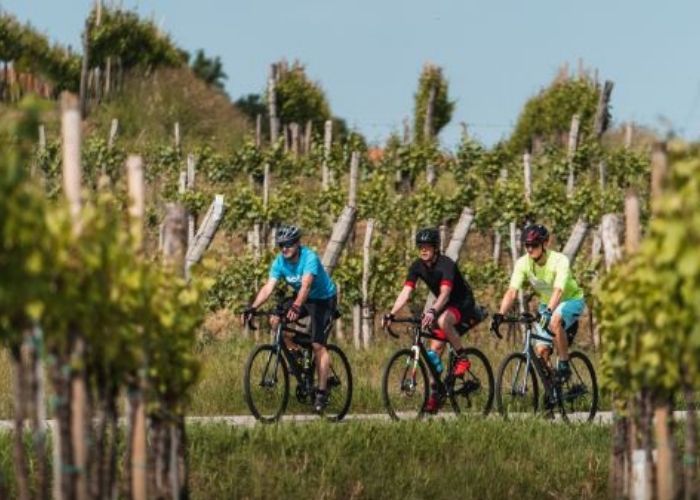
Bicyclers tour through vineyards in Tomaj.
This led us to the next step – introducing solutions for destinations and tourism businesses to improve their sustainability. While upgrading the Green Scheme, we introduced a special label, Slovenia Green Cuisine, with additional criteria and a new (gastronomic) module for destinations. It emphasizes promotion of local supply chains and relations with local producers, guiding them in their further development. Last and most important, as a result of these sustainability efforts members of Consortium Slovenia Green have created story-telling responsible tourism experiences – cycling through hops fields, a day at a karst farm, wine tasting in Ljubljana, and more (see www.slovenia-green.si)
We prepared the SGGR in collaboration with ten Slovenia Green destinations and numerous local tourism businesses. The route ties together gastronomic destinations with rich culinary offers, wines, and Michelin-starred restaurants. The trail follows country byways and forest roads, goes through vineyards and fields, and is suitable for cyclists of all levels. Bicycles take travellers to places that cannot be explored by other means of transport and to tourism providers in less accessible locations, hence creating business opportunities for small entrepreneurs in these locations. (See video – 28 minutes.)
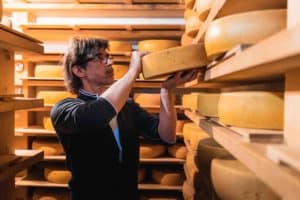
At Hiša Franko, Valter Kramar ages cheeses for up to 4 years.
Biking combines well with travelling by train, a sustainable form of transport that brings the east and west of the country closer. All Slovenian trains now provide special places for the bikes. Easy train-and-bike travel enables the SGGR itinerary to capture the diversity of Slovenian gastronomic destinations and include a wide range of tourism businesses.
Tourism providers promoted in the itinerary are small family-run accommodations and restaurants that have sustainability certificates and authentic boutique experiences removed from most famous tourist spots – tree house accommodation, glamping in forests or storied hotels in cities. The route can be customized for visitors by a professional travel agency Visit GoodPlace. Alternatively, travellers can organize their own tours by downloading a free e-book and navigation pack, which includes GPX tacks, Google map with points of interest, restaurants, accommodations, and tips for green travel.
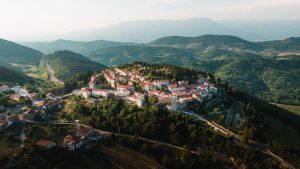
The Štanjel hill town features on the SGGR.
In summary, the SGGR enhances local businesses and enables destinations to promote and monetize their local stories and gastronomical specialties. It benefits the environment with sustainable transportation while reaching providers located in less accessible locations. It educates travellers on sustainable travel and the uniqueness of Slovenian destinations and their gastronomy. Creating tourism products that illustrate the sustainability efforts “pulls” the visitors into the scene. When sustainability is only communicated as a primary focus, an abstraction without a concrete product to demonstrate it, guests cannot recognize its true value. This way, they see how the concept of green routes rests on the efforts of destinations and tourism businesses and exemplifies their commitment to sustainable tourism development in practice.
We believe the inclusion of the local communities and tourists into the co-creation of tourism products is crucial. The support and satisfaction of the local community is the core of successful sustainable tourism development. Communities will support tourism if they benefit from it. Giving the locals new business opportunities is an important step towards responsible tourism development, creating added value for both residents and tourists.
About DSR Contributors
Volunteer contributors are welcome to the Destination Stewardship Report. Contact us with your proposals and ideas.


